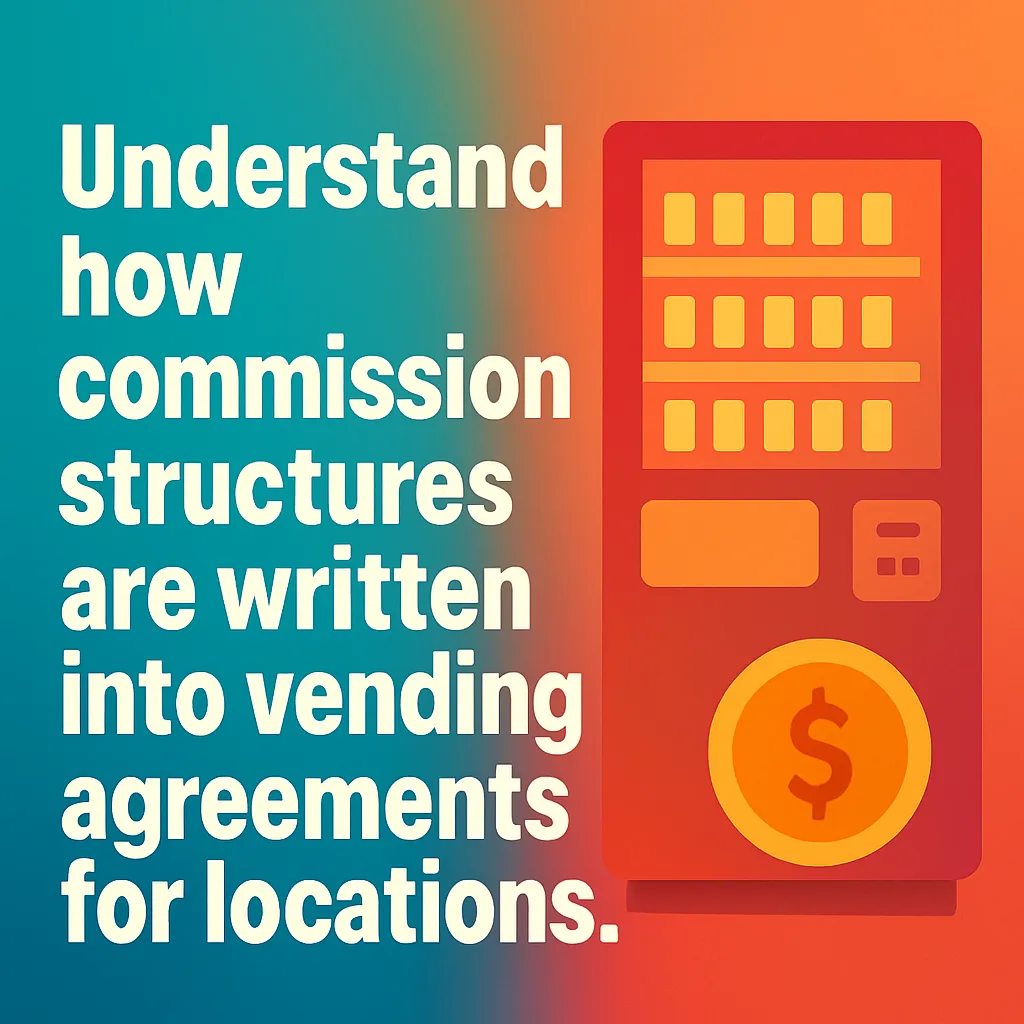Commissions in Vending Contracts: What You Need to Know
Understand how commission structures are written into vending agreements for locations.
Back to Vending Contracts ResourcesUnderstand how commission structures are written into vending agreements for locations.
Back to Vending Contracts ResourcesNegotiating favorable commission terms in your vending contract can significantly increase the financial benefits your location receives from hosting machines.
![]() Generate passive income from existing foot traffic
Generate passive income from existing foot traffic
![]() Understand factors that influence commission rates
Understand factors that influence commission rates
![]() Ensure transparent reporting and timely payouts
Ensure transparent reporting and timely payouts

For any business or commercial property considering hosting vending machines, a clear understanding of the vending contract – particularly the commission structure – is crucial. A vending commission is payment made by the vending service provider to the location owner based on the sales generated from the machines. This arrangement provides a passive income stream for the location without requiring any direct involvement in operating or stocking the machines.
Commissions are typically calculated as a percentage of the gross sales (total revenue before product cost deductions) or, less commonly, as a percentage of net profit. The exact terms are laid out in the vending contract, which also covers aspects such as machine types, product selection, maintenance responsibilities, and service schedules. It's essential for location owners to review these terms carefully, as they directly impact the financial benefits derived from the vending partnership. For a deeper dive into general vending contract terms, review our guide on how vending contracts work.
Several factors can influence the commission rate offered in a vending contract:
Commission rates are almost always negotiable. Location owners should be prepared to discuss terms that reflect the value their site brings to the vending operator. It's not uncommon to see rates ranging from 5% to 20%+ of gross sales, depending on the factors listed above. Some contracts might also include a flat monthly fee or a hybrid model combining a lower commission with a minimum guaranteed payment for very desirable locations.
Ensuring transparency in reporting is also key. The vending contract should stipulate how sales figures are tracked and reported, and how often payments will be made. Typically, monthly or quarterly payouts are standard, accompanied by detailed sales reports.
While commissions are a direct financial benefit, they're not the only value vending machines bring. They provide a convenient amenity for employees, customers, or visitors, potentially boosting morale and customer satisfaction. They can also minimize the need for employees to leave the premises for snacks and beverages, thus maximizing productivity. Many businesses simply want the convenience without the hassle, and operators often offer free vending machine options for offices that include full service without requiring a commission payout from the operator.
Whether you prioritize maximum commission revenue or simply reliable service as an amenity, understanding these contract details is essential before signing any agreement. A well-structured vending contract with fair commission terms ensures a mutually beneficial partnership.
A commission is a percentage of sales revenue paid by the vending operator to the location owner for the privilege of placing machines on their property.
Commissions are usually calculated as a percentage of gross sales from the vending machine, often excluding taxes, or sometimes based on net profit after product costs.
Typical commission rates can range from 5% to 20%+, depending on factors like location traffic, sales volume, and types of products sold.
Yes, some vending contracts might include a flat monthly or annual fee, or a hybrid model combining a lower commission with a minimum guaranteed payment.
Key factors include foot traffic, projected sales volume, product types (e.g., healthy vs. traditional snacks), machine types, and the location's desirability.
Absolutely. Commission rates are almost always negotiable. Location owners should assess their value and discuss terms with potential vending operators.
Payouts typically occur monthly or quarterly, as specified in the vending contract. Regular reporting from the operator should accompany payments.
Location owners should expect detailed sales reports outlining revenue per machine, product sales, and the calculation of the commission amount.
Sometimes. Healthy vending might have slightly different commission structures or attract locations seeking to promote wellness, potentially influencing rates.
Commissions stop for the period the machine is out of service. The contract should specify response times for repairs and how this impacts revenue.